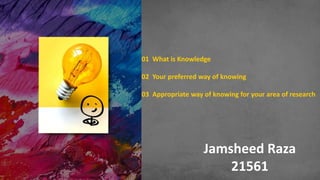
Knowledge - Philosophy
- 1. Jamsheed Raza 21561 01 What is Knowledge 02 Your preferred way of knowing 03 Appropriate way of knowing for your area of research
- 3. What is knowledge A single, simple and “substantially agreed upon” definition of knowledge is still awaited. However, for the purpose of this discussion I find the following as most appropriate definition “Knowledge is a type of belief that is distinct from opinion or guesswork by virtue of justification. A familiarity or awareness, of someone or something, such as facts (descriptive knowledge), skills (procedural knowledge), or objects (acquaintance knowledge) contributing to ones understanding.” Grimm, Stephen R. (2014)
- 4. What is knowledge For this course, we might be interested in categorizing knowledge into: - Personal Knowledge – Depends crucially on the experiences of a particular individual. It is gained through experience, practice and personal involvement and is bound up with the particular local circumstances of the individual such as biography, interests, values, and so on. Influenced by an individual’s personal perspective. Personal knowledge therefore includes what might be described as skills, practical abilities and individual talents. Knowledge of how to do something : play the piano, ride a bicycle, paint a portrait, so on.
- 5. What is knowledge - Shared Knowledge - Highly structured, systematic in its nature and the product of more than one individual. Much of it is bound together into more or less distinct areas of k nowledge. While individuals contribute to it, shared knowledge does not depend only upon the contributions of a particular individual—there are possibilities for others to check and amend individual contributions and add to the body of knowledge that already exists.
- 6. What is knowledge Links between shared and personal knowledge Clearly there are links and interactions between shared knowledge and personal knowledge. Albert Einstein contributed much to modern physics. Clearly, he had some personal qualities that enabled him to see further than some of his peers. He had personal knowledge, a way of looking at things perhaps, that he was able to use to propel his exploration of the difficult questions. But his insights had to go through a thorough process of review before being accepted as part of the shared body of knowledge that is the discipline of physics.
- 8. Way of knowing Ways of Knowing Explanation Language A system of signs (letter, symbols, sounds, etc.) with agreed or conventional meanings combined for the purposes of communication, formulation of ideas, storage of knowledge or as a medium of thought. Problems: Ambiguity, sarcasm, irony, translation issues, etc. Sense Perception Sense perception is the process by which we can gain knowledge about t he outside world. Sight, touch, smell, taste and hearing. Emotion You know certain things because you feel them emotionally. You know that certain things are ethically not right. - Naturalistic view – a natural process with physiological cause & effect. - Culturally bound emotions – emotions are product of cultural construct
- 9. Way of knowing Ways of Knowing Explanation Reason Drawing logical inference based on rules, systems, etc. Justification of events, conclusions, statements, etc. Imagination Capacity to form a mental representation of something without the stimulus of sense experience. Faith Here faith is referred in both senses, religious (following particular religion) and secular (humanism). Intuition Known without understanding how they are known. Memory Memory (previous experiences / knowledge) plays a vital role in how our personal knowledge is formed.
- 10. Preferred way of knowing for area of research
- 11. Preferred way of knowing - Area of research Knowledge framework One effective way to examine the Area of Knowledge (AOK) is through a knowledge framework. A knowledge framework is a way of unpacking the AOKs and provides a vocabulary for comparing AOKs. For each AOK the following can be examined: • scope, motivation and applications • specific terminology and concepts • methods used to produce knowledge • key historical developments • interaction with personal knowledge
- 12. Preferred way of knowing - Area of research Areas of Knowledge : • mathematics • natural sciences • Human sciences • history • the arts • ethics • religious knowledge systems • indigenous knowledge systems.
- 13. Ways of knowing The ways of knowing do not operate in isolation
- 14. Preferred way of knowing - Area of research • Interviews – Open ended Questions / Answer Text Coding Themes • Survey Questionnaire – Closed ended questions / answers Numerical Data Analysis Interpretation
- 15. Preferred way of knowing Human Resources Reason Language Memory Faith Intuition Imagination Emotion Sense Perception
- 16. Thank you
- 17. Thank you ..
